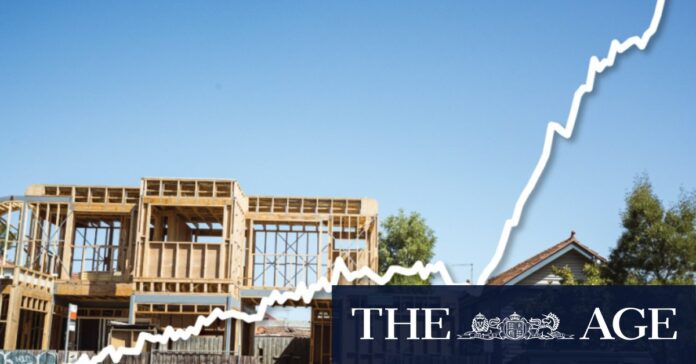[ad_1]
“The supply of timber was a major issue during COVID, but there’s plenty of timber now,” Dwyer said. “Even with the skills shortage we should be seeing costs reducing.”
Building costs started to rise at a much sharper rate through 2021 after COVID restrictions made transportation of hardware challenging, caused factory closures and meant increased demand for materials such as polypropylene – used in PPE but also in plastic piping used for plumbing.

The cost of building a new home is higher than ever.Credit: Dion Georgopoulos
Higher costs for materials coupled with a lack of workers, increasing building approval times and changes to land taxes meant builders had no choice but to pass on the costs to consumers, Master Builders Australia chief executive Denita Wawn said.
“It’s not as if the builders are making massive amounts of money,” Wawn said. She said many builders’ projects are fixed-price contracts, which in the past would factor in a 5 per cent buffer for cost increases.
“Now it’s 10 per cent. Many of these projects were tendered during COVID and have been built at a loss,” Wawn said. “I’ve had many builders say to me ‘we can’t put our hand up to do more work – the risk is too high’.”
Loading
There were 25 per cent fewer new apprentices starting in building and construction trades in the year to September 2023 than the year before, Wawn said, and nearly 8 per cent fewer apprentices completed their trade last year than in 2022.
It’s a problem that began years ago and Wawn said it was only getting worse, warning of a misplaced perception from parents that their offspring need to go to university to be successful.
She said the industry did need to consider factors including flexible hours and part-time work, along with doing more to attract women to study and work in a trade, and making it easier for skilled migrants to be licensed in Australia.
With the federal government’s target to build 1.2 million new homes by 2029, there was an acute demand for construction trades. According to Master Builders’ recent budget submission, 90,000 extra workers were needed by September this year to build the 60,000 homes per quarter needed to stay on the 2029 target.

Labour and materials costs have risen.Credit: Dion Georgopoulos
Dwyer said increased immigration had contributed to high housing costs, but that Australia did need more skilled migrants to build the necessary homes. “We’re not targeting those skills with the people who are coming,” he said. “It’s a fine balance.”
Along with more skilled workers, builders should be incentivised to take on apprentices, Dwyer said, to ensure not only a higher quantity of homes were built, but also a higher quality.
“We have the dearest housing in the world – that in itself says we should have the best housing in the world, but we don’t,” he said.
[ad_2]
Source link


